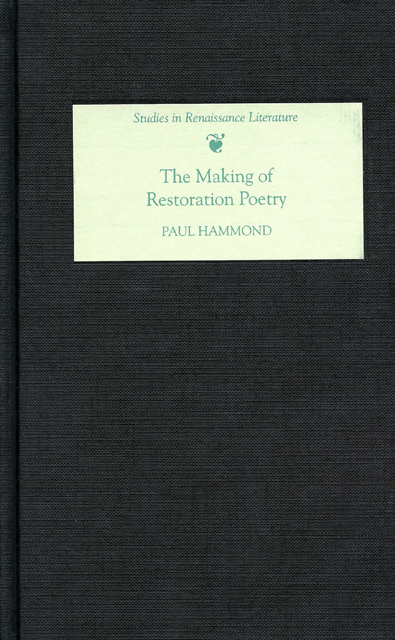10 - Rochester and his Editors
Published online by Cambridge University Press: 18 March 2023
Summary
He takes me in his Coach, and as wee goe
Pulls out a Libell, of a Sheete or Two;
Insipid as the Praise, of Pious Queenes,
Or Shadwells, unassisted former Scenes;
Which he admir’d, and prais’d at evr’y Line,
At last, it was soe sharpe, it must be mine.
I vow’d, I was noe more a Witt than he,
Unpractic’d, and unblest in Poetry:
A Song to Phillis, I perhaps might make,
But never Rhym’d but for my Pintles sake;
I envy’d noe Mans Fortune, nor his Fame,
Nor ever thought of a Revenge soe tame.
He knew my Stile (he swore) and twas in vaine
Thus to deny, the Issue of my Braine.
Choakt with his flatt’ry I noe answer make,
But silent leave him to his deare mistake.
Which he, by this, has spread o’re the whole Town,
And me, with an officious Lye, undone.
IN THIS passage Rochester recounts the experience of being accosted by an admirer who has come across an anonymous satire and recognized it as his by its style. Though Rochester denies authorship, the admirer refuses to believe him, and circulates the poem through the town with this erroneous attribution. It is a vivid example of the way poetry circulated in the period, and of the hazards of attribution, especially when a major name like Rochester's is speculatively attached to all manner of verses. Except that this is not Rochester speaking: it is the persona of Timon in a satire modelled on Boileau's adaptation of Horace, and so the voice is both a fictional Restoration voice and one which echoes the complaints of French and Roman poets. All too often editors and critics have assimilated the voice in Rochester's poems to that of the historical John Wilmot, regardless of the games which are played with voice and role right across his oeuvre. Moreover, this poem, though it appears in every twentieth-century edition of his work, may not even have been written by Rochester. As Harold Love explains:
The poem is attributed to Rochester in three manuscripts only, in one of which his name has been deleted and replaced by Sedley’s. Two other manuscripts attribute the poem to Sedley, and four give no author. The printed sources (some of which attribute the poem, or a share in it, to Buckingham) are of no authority.
So much for recognizing a poet by his style.
- Type
- Chapter
- Information
- The Making of Restoration Poetry , pp. 190 - 212Publisher: Boydell & BrewerPrint publication year: 2006
- 1
- Cited by

